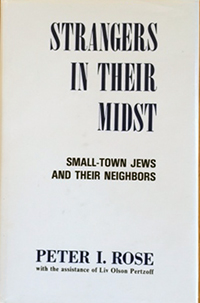Strangers in Their Midst
 A report on a study of small-town Jews and their neighbors conducted in the late 1950s and a follow-up conducted with the grown-up children of the small-town Jews carried out by the author and his student, Liv Olsen Perxoff in the 1970s. A key concept being considered is “the exemption mechanism” and the role played by “exemption” in altering stereotypes and, in turn, personal relations between Jews and others in very small communities in non-metropolitan counties of New York state, and parts of Vermont and Pennsylvania.
A report on a study of small-town Jews and their neighbors conducted in the late 1950s and a follow-up conducted with the grown-up children of the small-town Jews carried out by the author and his student, Liv Olsen Perxoff in the 1970s. A key concept being considered is “the exemption mechanism” and the role played by “exemption” in altering stereotypes and, in turn, personal relations between Jews and others in very small communities in non-metropolitan counties of New York state, and parts of Vermont and Pennsylvania.
Published by:
Richwood Publishing Company
Pub date: April 1977
224 pp, HC, 5.5 x 8.6
ISBN 978-0915172320
Excerpts from Reviews of Strangers in Their Midst
From the American Journal of Sociology, March, 1979
As Marshall Sklare once noted, “Jews, more than any other group, have been among America’s most enthusiastic city-dwells. Not only have they themselves adapted to urban life, they have also evolved a major role in supplying others with many of its amenities. Nevertheless, for most Jews such an urban existence was never a repetition of their European experience. There they lived in the small, rural village – the shtetl. Yet although many came from such villages, they seldom idealized that rural experience for they realized that in their shtetl existence they had occupation the bottom rung in the social order….
In the late fifties, Peter Rose, then a graduate student in sociology at Cornell, decided to examine and interview those Jews who, unlike 98 percent of their brethren in America, had chosen to live in small towns. [He also studied the attitudes of their neighbors.]. Twenty years later, with one of his students [Liv Olsen Pertzoff], Rose returned to revisit the issue. What emerges from this joint effort is a portrait of an American Jewish experience which was “swift as a shadow and short as any dream.” The world of the small-town Jews of upstate New York is no longer; their children have gone to the cities.
…. However successful economically and professionally the small-town Jew became, he saw himself relegated to the ascribed role of “ambassador,” one who provides an acceptable model of his people for others. As Louis Wirth once put it, “getting out into the Christian world made the Jew self-conscious.”… Yet, instead of becoming “exemplary,” conceived by their Gentile neighbors as representative of Jews in general, the small-town Jews studied by Rose were viewed by those among whom they lived as “exempted” – different and special. Only occasionally did Rose discover evidence that Gentile attitudes toward the Jews were improved as a result of an intimate and positive experience with a particular Jews. Over 80 percent of the Christian opinion leaders whom Rose polled in his small towns continued to think of Jews in terms of negative stereotypes of shrewdness, aggressiveness, clannishness, and the like….Jews describe themselves in terms which belie anti-Semitic, Christian stereotypes: Jews are “not underhanded or shrewd.” In short, whether happy or not in the small town he inhabits, he [the Jew] acts as if he were there by the consent and sufferance of the dominant Gentile culture…
The lesson of this life was not lost upon his children. Most have left, not really to the surprise of their parents. Nearly half of those polled by Rose expressed a desire to have their children leave the small town.
Rose and Pertzoff have given us a unique glimpse of one American Jewish character. Perhaps most interestingly, this description of a deviant Jewish life form is further evidence that in America, as in Europe, in the final analysis, “a Jew,” as the philosopher Nathan Rotenstreich once put it, “is a Jew only when he is with other Jews.”
-Samuel C. Heilman, Queens College, City University of Nw York